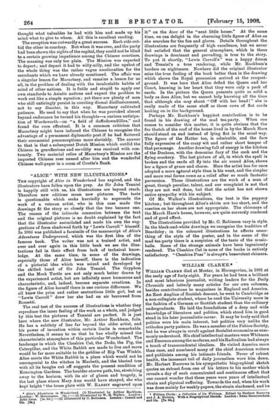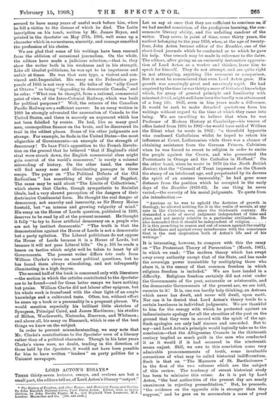WILLIAM CLARKE.*
WILLIAM CLARKE died at Mostar, in Herzegovina, in 1901 at the early age of forty-eight. For years he had been a brilliant and most laborious journalist, writing leaders for the Daily Chronicle and latterly many articles for our own columns, besides contributions to magazines in England and America. An East Anglian of Scottish descent, he went to Cambridge as a non-collegiate student, where be used the University more in the fashion of a German or Scottish student than the ordinary undergraduate. He laid the foundations of a deep and wide knowledge of literature and politics, which stood him in good stead in his later journalistic career. It may be truly said that politics were his main interest, but politics very unlike the orthodox party pattern. He was a member of the Fabian Society, but be was always in revolt against Socialist economics as com- monly understood. His chief intellectual masters were Whitman and Emerson among the moderns, and his Radicalism had always a touch of transcendental idealism. He visited America more than once, and numbered many of the chief American writers and publicists among his intimate friends. Never of robust health, the incessant toil of daily journalism wore him down. Mr. Herbert Burrows in his sympathetic biographical sketch quotes an extract from one of his letters to his mother which reveals a day of such concentrated and continuous effort that one cannot wonder that these years were years of intellectual strain and physical suffering. Towards the end, when his work was done mainly for weekly papers, the strain slackened, and he • William Clarke : a Collection of his Writings. Edited by Herbert Burrows and J. A. Hobson. With a Biographical Sketch. London: Swan Sonnenschein and Co. [78. 6dj seemed to have many years of useful work before him, when he fell a victim to the disease of which he died. The Latin inscription on his tomb, written by Mr. James Bryce, and printed in the Spectator on May 27th, 1905, well sums up a character which in earnestness, sincerity, and courage ennobled the profession of his choice.
We are glad that some of his writings have been rescued from the oblivion of occasional journalism. On the whole, the editors have made a judicious selection,—that is, they show the writer both in his weakness and in his strength. Like all idealist politicians, he was apt to be impetuous and unfair at times. He was that rare type, a violent and con- vinced anti-Imperialist. His essay on the Federation pro- posals of 1885 is not very wise. He talks of the "silly Court at Ottawa" as being "degrading to democratic Canada," and he asks: "What can be thought., from a rational, commercial point of view, of the Inter-Colonial Railway, which was built for political purposes ?" Well, the returns of the Canadian Pacific Railway are a sufficient answer. In an essay written in 1880 he strongly advocated the annexation of Canada to the United States, and there is scarcely an argument which has not been falsified by events. He had, like so many good men, cosmopolitan finance on the brain, and he discovered its trail in the oddest places. Some of his other judgments are strange. For example, he finds in the United States—the most oligarchic of Governments—an example of the strength of democracy ! To base Pitt's opposition to the French Revolu- tion on the ground that he believed "that if England's chief rival were struck down, the English commercial class might gain control of the world's commerce," is surely a colossal misreading of history. On the other hand, the reader will find many sane and illuminating passages in these essays. The paper on "The Political Defects of the Old Radicalism" has something of the quality of Bagehot. The same may be said about "The Limits of Collectivism," which shows that Clarke, though sympathetic to Socialist ideals, had a very shrewd perception of the dangers of their doctrinaire Continental form. He thought the real danger of democracy, not anarchy and insecurity, as Sir Henry Maine foretold, but "an intense and growing vulgarity of mind." His essay on the House of Lords question, published in 1899, deserves to be read by all at the present moment. He thought it folly "to try to force artificial democracy on a people who are not by instinct democratic." "The truth is that the demonstration against the House of Lords is not a democratic but a party agitation. The Liberal politicians do not oppose the House of Lords because it is a House of Lords, but because it will not pass Liberal bills." On p. 105 he reads a lesson on tactics which might well be taken to heart by all Governments. The present writer differs toto coelo from William Clarke's views on most political questions, but he has found them always stimulating, and not infrequently illuminating in a high degree.
The second half of the book is concerned only with literature —the section in which the articles contributed to the Spectator are to be found—and for these latter essays we have nothing but praise. William Clarke did not labour after epigram, but his whole work is transfused with the clear light of an ample knowledge and a cultivated taste. Often, too, without effort he sums up a book or a personality in a pregnant phrase. We would mention especially his brilliant little sketches of Spurgeon, Principal Caird, and James Martineau; his studies of Milton, Wordsworth, Nietzsche, Emerson, and Whitman ; and above all, his essay on Bismarck, which is one of the best things we know on the subject.
In order to prevent misunderstanding, we may note that Mr. Clarke's contributions to the Spectator were of a literary rather than of a political character. Though in his later years Clarke's views were, no doubt, tending in the direction of those held by the Spectator, it would not have been possible for him to have written " leaders " on party politics for a Unionist newspaper.





































 Previous page
Previous page